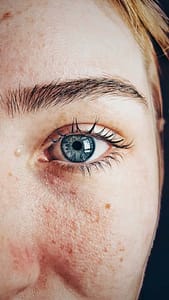Understanding Skin Changes
The skin is often referred to as the window to your body’s internal workings, including the impacts of stress. As you face life’s challenges, your skin can be a telltale sign of the stress you’re feeling, especially during significant life changes such as menopause or perimenopause.
Impact of Stress on Skin
You might have noticed that during periods of higher stress, your skin becomes more sensitive and reactive. This is not just a coincidence. Stress triggers a chemical response in your body that can make your skin more prone to problems. When stressed, your body produces hormones such as cortisol, which can lead to increased oil production in your skin glands, making you more susceptible to acne and other skin concerns (WebMD).
Moreover, stress may not only intensify existing skin issues but also interfere with your daily skincare routines, potentially leading to a worsening of skin conditions. It’s important to recognize these changes so that you can address them with the appropriate skincare routines and stress-reducing interventions.
Skin Conditions Exacerbated by Stress
Various skin conditions can be exacerbated by stress. Conditions such as psoriasis, rosacea, and eczema may flare up when you’re feeling overwhelmed. Even if you do not have chronic skin conditions, you might experience hives, skin rashes, or fever blisters as a result of heightened stress levels (WebMD).
Chronic stress not only leads to physiological changes that negatively impact your skin but also may encourage habits that are detrimental to skin health, such as grinding teeth or biting lips (Healthline). Additionally, impaired barrier function due to stress can result in dry, itchy skin and slow the skin’s ability to heal itself. A weakened immune system under stress may also cause an imbalance of bacteria on the skin, leading to rashes or inflamed skin (Healthline).
By understanding the connection between stress and skin health, you can take proactive steps to manage both. This might include adopting holistic practices, adjusting your beauty regimen, and seeking support for stress management. To get a comprehensive view of how hormonal fluctuations affect your skin, explore related topics like hormonal skin changes, skin changes during pregnancy, and skin changes after childbirth.
Effects of Stress on Skin Health
The skin is the body’s largest organ and a direct reflection of internal well-being. As you navigate through different phases of life, including menopause and beyond, it’s imperative to understand how stress can affect skin health.
Hormonal Response to Stress
When you experience stress, your body responds by producing hormones, such as cortisol, to help you deal with the situation. This chemical response can make your skin more sensitive and reactive, potentially exacerbating skin issues or making it harder for them to heal. Elevated cortisol levels can lead to increased oil production in the skin glands, making you more prone to acne and other skin disturbances.
| Stress Hormone | Effect on Skin |
|---|---|
| Cortisol | Increases oil production, may worsen acne |
| Adrenaline | Can cause pale or flushed skin |
| CRH (Corticotropin-releasing hormone) | May increase inflammation |
Moreover, excess cortisol can accelerate the loss of collagen and elastin, essential proteins that maintain skin structure and elasticity. As a result, you might notice an increase in the appearance of wrinkles and sagging skin (California Skin Institute). Understanding these hormonal skin changes is the first step towards mitigating their impact.
Skin Barrier Function
Your skin acts as a protective barrier between your internal organs and the external environment. Stress can impair the function of the stratum corneum, the outermost layer of the skin, leading to issues such as dryness, itchiness, and slowed healing. Research shows that stressed individuals may experience a delay in the skin barrier’s ability to repair itself after damage.
Chronic stress not only leads to physiological changes but may also contribute to unhealthy habits that further damage the skin, such as grinding teeth or biting lips. These behaviors can exacerbate skin problems and hinder the healing process.
To support your skin barrier function and overall skin health, consider adopting stress-reducing interventions and a consistent skincare routine. Additionally, exploring holistic approaches like nutrition and hydration can complement your efforts to maintain healthy, resilient skin despite the challenges posed by stress.
Managing Stress-Related Skin Issues
Navigating the challenges of stress-related skin changes requires a two-pronged approach: implementing a consistent skincare routine and integrating stress-reducing interventions. These strategies can help mitigate the impact of stress on your skin, promoting a healthier complexion and emotional well-being.
Skincare Routines
Your skincare routine plays a pivotal role in managing stress-related skin issues. When stress levels rise, you might be tempted to neglect your skincare regimen, which can exacerbate skin problems. Counterintuitively, taking the time to care for your skin can actually reduce stress. A study by Rodan + Fields found that following a three-step skincare routine led to a dramatic decrease in cortisol levels, by approximately 83%, after eight weeks. Participants also reported feeling 76% more self-assured in their skin (Harper’s Bazaar).
To effectively manage your skin health:
- Cleanse: Use a gentle cleanser suited to your skin type to remove impurities and excess oil without stripping the skin.
- Treat: Apply targeted treatments for any specific issues, such as serums for ageing skin or acne.
- Moisturize: Hydrate and protect your skin with a moisturizer that complements your skin’s needs, taking into account any changes due to menopause or other hormonal fluctuations.
Remember, small acts of self-care, like maintaining a skincare routine, can help you feel in control and promote a sense of calm (Harper’s Bazaar). Additionally, stay informed about how different life stages affect your skin by reading about skin changes during puberty, menstruation, and after childbirth.
Stress-Reducing Interventions
To complement your skincare routine, incorporate interventions that specifically target stress reduction:
- Physical Activity: Engage in regular exercise to promote blood circulation and support skin health while releasing endorphins to lower stress levels.
- Mindful Eating: Opt for a balanced diet rich in antioxidants and essential nutrients to support skin health and nutrition.
- Adequate Sleep: Prioritize getting enough restorative sleep, as it’s crucial for both skin repair and stress management.
- Facial Treatments: Consider scheduling professional facial treatments that can provide both relaxation and targeted skin benefits.
According to the California Skin Institute, these practices not only help manage stress but also improve overall skin health. By taking a holistic approach to stress management, you can create a positive impact on both your skin and emotional well-being. It’s important to find stress-relief activities that work best for you, whether it’s yoga, meditation, or simply taking a moment to breathe deeply and hydrate your body for improved skin hydration.
Holistic Approaches to Skin and Stress
As you navigate through changes in your skin, especially during pivotal times like menopause, it’s beneficial to consider holistic approaches that support both your skin health and your overall stress levels. Integrating mind-body practices and nutritional support can play a significant role in managing skin changes and stress.
Mind-Body Practices
Mind-body practices are proven to help regulate the stress response, which can lead to an improvement in skin conditions exacerbated by stress. Engaging in activities such as meditation, yoga, tai chi, or qigong can reduce symptoms of anxiety and depression, fostering a sense of well-being (American Academy of Dermatology).
| Practice | Benefits |
|---|---|
| Meditation | Reduces stress, improves focus |
| Yoga | Decreases stress, enhances flexibility |
| Tai Chi | Lowers anxiety, increases energy |
| Qigong | Reduces stress, promotes healing |
Incorporating these activities into your routine can not only help you manage stress but also assist in maintaining healthy skin. Breathwork and visualization are additional techniques that can be practiced even during short breaks, making them easy to fit into a busy schedule. These practices are most beneficial when combined with other treatments, so consider them as part of a comprehensive approach to your skin health.
Nutritional Support
Nutrition plays a critical role in managing stress and supporting skin health. Mindful eating and maintaining a diet rich in antioxidants, healthy fats, and adequate hydration can contribute to improved skin condition. Foods that are high in vitamins A, C, E, and omega-3 fatty acids are known to promote skin health and may help combat the effects of stress on the skin.
| Nutrient | Sources |
|---|---|
| Vitamin A | Carrots, sweet potatoes, spinach |
| Vitamin C | Oranges, strawberries, bell peppers |
| Vitamin E | Almonds, sunflower seeds, avocados |
| Omega-3 Fatty Acids | Salmon, flaxseeds, walnuts |
Staying hydrated is another crucial aspect of maintaining skin health. Adequate water intake ensures that your skin remains hydrated from the inside out, which can enhance its appearance and resilience. For more information on how nutrition and hydration affect your skin, visit our articles on skin changes and nutrition and skin changes and hydration.
By embracing these holistic approaches, you can create a supportive environment for your skin to thrive, even in the face of stress. Remember that these strategies work best when integrated into your everyday life, alongside any medical treatments you may be receiving for skin conditions. Small acts of self-care, such as establishing a skincare routine, can also provide a sense of control and reduce stress. Take the time to nurture your mind and body, and your skin will thank you for it.


